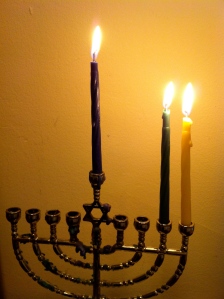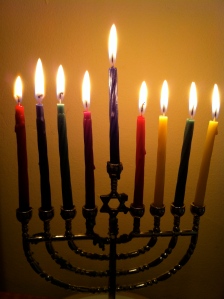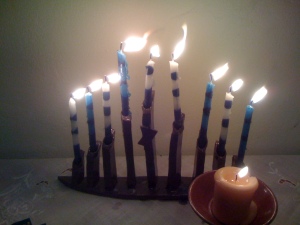Heri za Kwanzaa! Happy Kwanzaa!

This post is for intentionally multicultural communities celebrating Kwanzaa. As an intentionally multicultural faith community, the Unitarian Universalist Association encouraged faith leaders to learn more about and honor Kwanzaa this year.
To learn more about Kwanzaa, visit the founder of Kwanzaa’s website
http://www.officialkwanzaawebsite.org/index.shtml
Kwanzaa is celebrated December 26 through January 1. Kwanzaa invites us into seven pan-African Black Power values. Dr. Maulana Karenga created the first Kwanzaa celebration in 1964. Now, two generations of children have grown up with Kwanzaa and more families choose to celebrate Kwanzaa each year. Intentionally multicultural communities also celebrate Kwanzaa, recognizing both the importance of a holiday honoring pan-African wisdom for everyone and the need to attend to cultivating pride and belonging to those rich sources of wisdom for a part of our community that still faces discrimination daily.
When celebrating Kwanzaa as intentionally multicultural communities, we pay particular attention to not adding values and culture that are from beyond the African Diaspora, so as not to violate the value of self-determination. The demands of assimilation and loss of culture is both a legacy of slavery and part of the daily struggle today, another of the practices of oppression and injustice Kwanzaa turns us away from. When Unitarian Universalists voted in the late 1960s to give a grant to Dr. Karenga for sharing the wisdom of Kwanzaa, we voted as an intentionally multicultural community to honor and support this principle of self-determination. Today, it might seem less revolutionary than it did in the late 1960s that healthy multicultural communities make room to honor each other’s differences and embody the principle of self-determination for each of the cultural communities that are part of the whole. Still, the learning continues for many of us. I am including links to Dr. Karenga’s website to encourage all of us to honor the wisdom of self-determination.
http://www.officialkwanzaawebsite.org/celeb-procedures.shtmlCelebrants set out a Mkeka (a woven grass mat) and place the Kinara, the Kwanzaa candle holder, upon it. Seven candles are set into the Kinara. Three of these candles are red, three are green. The center candle is black, celebrating the peoples of the African Diaspora. Red symbolizes the people’s struggle and green hope for the people’s future. A unity cup, harvest crops, corn, and gifts are also placed on the Mkeka around the Kinara.
Each night, families and communities light candles and share stories, gifts, and wisdom that turn us to each of the Nguzo Saba. I have added questions to be asked in intentionally multicultural communities so that all might learn from the Nguzo Saba and honor self-determination, inviting stories and wisdom from members of the community who belong to the African Disapora.
December 26th – Light the black candle. The first principle is Umoja (Unity) in family, community, nation and race.
Questions for the community: Why is Umoja so important? What current conditions and what history make Umoja so necessary today? How is healthy multicultural community stronger because of Umoja?
December 27th – Light the black candle and the first red candle, symbolizing the people and the people’s struggle. The second principle is Kujichagulia (Self-Determination) in defining and naming ourselves, creating and speaking for ourselves.
Questions for the community: Why is Kujichagulia so important? What history and current conditions make Kujichagulia a value for every day? How do healthy multicultural communities embody Kujichagulia?
December 28th – Light the black candle and two red candles, symbolizing the people and the people’s struggle. The third principle is Ujima (Collective Work and Responsibility), growing and holding community together, solving our brothers’ and sisters’ problems together.
Questions for the community: Why is Ujima so important? What current conditions and history make Ujima still a struggle for today? How can healthy multicultural communities practice Ujima?
December 29th – Light the black candle and all three red candles, symbolizing the people and the people’s struggle. The fourth principle is Ujamaa (Cooperative Economics), building and maintaining own stores, shops, and other businesses and for the the pan-African community to profit from them together.
Questions for the community: Why is Ujamaa so important? What history and current conditions make Ujamaa so important? Where do you and your family spend its money and work? How can healthy multicultural communities support a healthy economy for African Americans, Afro-Caribbeans, and African immigrants?
December 30th – Light the black candle, all three red candles, and the first green candle, symbolizing the people, the people’s struggle, and the people’s hopes. The fifth principle is Nia (Purpose), creating as our calling the building and development of the community in order to restore peoples of the African Diaspora to traditional greatness.
Questions for the community: Why is Nia so important? What current experiences, barriers, and attitudes challenge and distract from Nia? Why does Nia contribute to hope for the future? How do healthy multicultural communities support and live in solidarity with Nia?
December 31st – Light the black candle, all three red candles, and two green candles, symbolizing the people, the people’s struggle, and the people’s hopes. The sixth principle is Kuumba (Creativity), where we do as much as possible in every way we can to leave the community more beautiful and beneficial than when we inherited it.
Questions for the community: Why is Kuumba so important? What conditions, attitudes, barriers, and experiences work against Kuumba? Why does Kuumba contribute to hope for the future? How do healthy multicultural communities live creatively in solidarity and support with Kuumba?
January 1st – Light the black candle, all three red candles, and all three green candles, symbolizing the people, the people’s struggle, and the people’s hopes. The seventh principle is Imani (Faith), believing with all our hearts in our people, parents, teachers, leaders, and righteousness and victory of our struggle.
Questions for the community: Why is Imani so important? What attitudes, barriers, experiences and conditions work against Imani? Why does Imani contribute to hope for the future? How do healthy multicultural communities live in solidarity and support of Imani? Where are all our hearts?
Heri za Kwanzaa! Happy Kwanzaa!
May you have a wonderful Kwanzaa, whether for the first time or as a family tradition! May our healthy multicultural faith communities honor the Nguzo Saba and grow stronger in our diverse wisdom and gifts!











